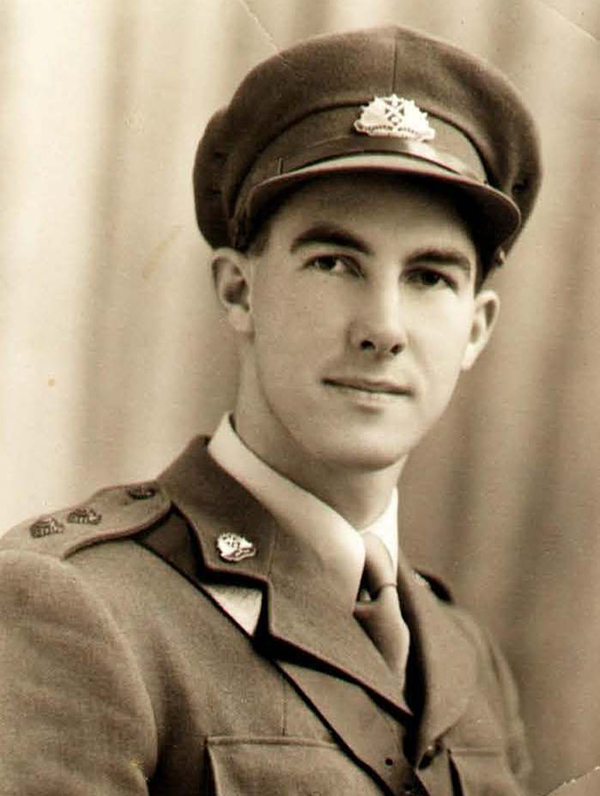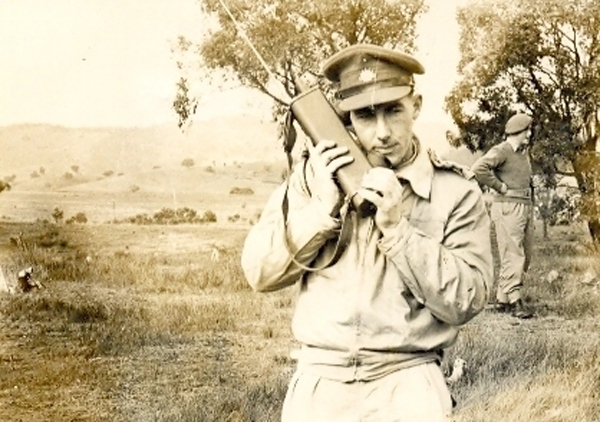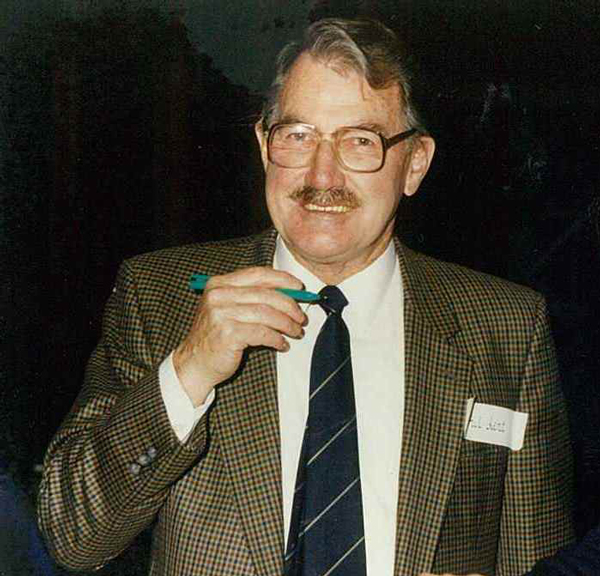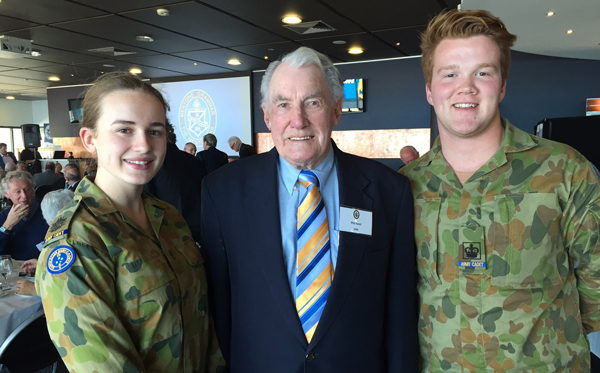PHIL KENT (1948)
I arrived at Mentone Grammar School in 1947 from a large country High School in Warrugal at the tender age of 16. My parents wanted to “finish me off” with a good private school education.
I was immediately struck by the esoteric and microscopic nature of the place. To me it seemed like the “Fawlty Towers” of private education, with Jeffrey Thorold, (then owner and principal) playing the quieter role of Basil Fawlty. It had a tiny oval (but with a turf wicket) and cramped classrooms; almost every student was a boarder and I was to be a day boy living in Braeside, some 7 or 8 kms from Mentone.
It was a dramatic turnaround from Warragul High School with its wide open spaces, co-education, and extensive classroom space, but I fitted in well. I was even able to persuade the Principal at times in 1948 that I was too exhausted to ride my bike home all the way to Braeside so, “would it be alright sir if I stayed overnight so I could be really fit for tomorrow’s game?” He realized that in order to have a fit Phil Kent (after all I was football and athletics captain), it would only cost him a dollop of porridge and use of a spare wooden bunk in what seemed like a portable army hut with fly-wire windows (this was “A” Dorm). It was primitive but fun!
Now I had never heard of “cadets”, or “cadet units”. In 1947 we were still overcoming the horrors of World War II and it was quite amazing to me that military life was still alive and thriving in Melbourne’s private schools. There were no cadet units in Gippsland, so at the age of 16 in Year 11, I became a raw cadet in the M.G.S. Cadet Unit where almost sixty cadets were wearing proudly the shoulder titles, “Australian Cadet Corps” Our commanding officer was Lieut. E. R. Dale and our one and only cadet officer was Cadet-Lieut. John Radford (also school captain).
Well in 1948 things started to move! I was selected as a raw rookie to go to Balcombe Army Camp to undergo training to become a cadet-lieutenant along with Derek Deighton (later to become a Major General in the A.M.F.) So we were the Cadet Officers of 1948.
Things looked grim for the Mentone Grammar School Cadet Unit when the company O.C., E.R. Dale resigned from the school staff in 1949. Other staff officers also left in 1948 and Cadet Lieut. Deighton went to Duntroon Military College. In 1949 I was invited by Jeffrey Thorold to join the teaching staff as a sportsmaster and boarding-house master, so the vacancy of Commanding Officer was finally filled by Cadet Lieut. P. G. Kent – the only survivor – from a raw cadet in 1947 to O.C. in 1949. Now one would have to say that is rapid promotion; albeit quite fortuitous!
Things progressed slowly until 1952 as there were no cadet camps, only the occasional “march past” or “route march”. But in this year however we gained the services of D. G. Strongman who hailed from England where he served in World War II, the highlight of the year being the Annual Camp at Bandiana and our M.G.S. presentation of a cadet flag in November.
Deryck Strongman’s arrival and participation was a blessing since the cadet force in Victoria was growing in strength and our unit was expanding rapidly. Together we conducted operations for the next 16 years until I resigned from Mentone Grammar School in 1968. Cadet camps were held regularly in a variety of locations starting with Puyckapunyal, then Site 17 Seymour and Scrub Hill in Central Victoria, later Mildura, then to Ballarat and finally (for me) at the Lord Mayor’s Camp at Portsea which was rather like progressing from Auscwitch to “The Hilton”! Incidentally, this is where Deryck met his wife to be – in the Portsea Hotel. His role as Adjutant of our unit suffered little. He combined efficiency with romance!
The change in venues proved interesting. A camp in August in Mildura meant nice weather, good accommodation, but bivouacs that required cadets to crawl around in red dust amongst Mallee scrub and occasional contact with frilly necked lizards was not so rewarding although it provided cadets with interesting stories to take home to Melbourne.
In these progressive years there seemed to be an enormous glut of ammunition left over from the war, thus cadets spent a lot of time on the range. Security in the late 40s and early 50s was a little low, and cadets would smuggle a lot of ammunition from the range and “play” with it in their huts or tents at night, until one sad occasion when a Scotch College cadet was accidentally shot with a .303 rifle at Puckapuynyal. Things immediately tightened up.
However there were some humourous moments I recall, such as the day on the open rifle range at Puckapunyal when we were rostered alongside Scotch College, Brighton Grammar and Haileybury College. We had in our ranks a new arrival, a year 9 student called Peter (“Pedro”) Layton, who had already demonstrated an extraordinary capacity for the unpredictable and the disastrous. This was to be his first experience with an L.M.G. Bren gun. All of our good instructors had briefed cadets with reminders like, “Do not pull the weapon in toward your body – ease your body into the weapon”. (Since the weapon is only supported by a bipod it seemed obvious advice). “Pedro” had no respect for finer points – he knew he simply had to “discharge 25 rounds, automatic, at your respective targets…….fire when ready”!
He heard the order, grabbed the trigger, closed his eyes and went for it! The venomous machine slewed over on its bipod and the onslaught began. Bullets sprayed up the slope of Mt. Disappointment (or was it Mt. Certainty?), crashed into a tin shed on the hill slope which was housing an unfortunate couple of sheep which bleated their way out, then the worst…….the last rounds wiped out all the serious scoring on the targets of the other three units. Mentone Grammar was making its mark!
Much of our cadet life was spent in Central Victoria. I recall now with amazement sleeping on the crest of Scrub Hill, in the rain, in a “poncho”, shared by Lieut. Hugh Green. Our mattress was a ground-sheet spread over granite rock – a most uncomfortable night on this bivouac, particularly when one noticed that Capt. F. Northcote of Haileybury College was spending the same night in his caravan close to the same location. The reason for my amazement at this event is that in 2008 Major Hugh Green outlasted all his predecessors, though I doubt that he any longer sleeps on Scrub Hill!
It was the middle of a wet winter. Cadets came back from Scrub Hill to the main camp at “Pucka” with wet clothes, boots and webbing, so keen to be dry in the morning they queued up to place their boots and webbing around (or on!) a pot-belly stove in the assembly hall so that they might dry out overnight. They did dry out, but the most desperate cadets had placed them on the stove, so in the morning their boots were not only dry, they cracked in half along with all their webbing. I fail to remember the outcome, but at least all cadets were dry.
In 1955 I was promoted to Captain for no other reason than that our unit had increased in size. For the first time we were permitted to have four cadet under officers (which had replaced Cadet Lieutenants), four complete platoons and over 100 cadets.
The 1960s were interesting and exciting years, with new buildings and new faces. Fresh from the military parade ground emerged the one and only R.S.M. Bruce E. Lobb, retired A.R.A. to be School Marshall. Bruce was a well-known icon throughout Victoria because of his dramatic presence on the parade ground. Not long before his appointment a new chaplain fresh from the interior of Australia, Jim Winter, arrived. Both Winter and Lobb made it into the Cadet Unit and they both had at least one thing in common. On parade neither required a public address system. When “Lobby” called out on the parade ground at Puckapunyal all the marsupials in Central Victoria froze. And when Jim Winter said the Lord’s Prayer one had the immediate feeling that the Lord didn’t need to move in wondrous or mysterious ways to get within audio range.
These men were both great assets to the growth and prestige of our cadet unit during the 1960s, and probably beyond into the 70s and 80s.
By 1963 I had been promoted to Major and Deryck Strongman to Captain. Both of us had received Cadet Force Medals for no other reason than we had stayed in harness for 12 years. (One might say that’s deserving of more than a medal!)
I remember yet another anecdote. Whenever we were in camp at Puckapunyal there was always a “march past” to celebrate some military event. Though I cannot recall the event I can recall the mischievous motivations of some members of our unit. The unit had assembled on the parade ground and I, in the lead, had to direct the “march past” through the narrow streets of the camp. Ahead of me I could hear the beat of drums from our cadet band and marched forth with dignity and pride. Little did I know that someone in the unit had sent around the message to “slow down and let him go!” – which they did. So I marched on, little knowing that the whole cadet unit was almost marching “on the spot”. I decided when reaching a bend in the road to look behind to find that I was almost 100 metres away from the rest of the unit. In the end I did an “about turn” marched back, and to this day I cannot recall the culprit who organized my dismissal..
The “march past” suddenly reminds me of 20 years earlier when I was at Balcombe Military Camp enrolled in the Cadet Lieutenant course. Several of us cadets, from various schools, had been unruly and noisy that evening because tomorrow heralded our final day in camp. As a result, Major Umphelby the 3 Cadet Brigade commander, ordered that we all go for a long march to Mt. Martha and back and he insisted upon supervising the entire exercise. This meant he had, at times, to march backwards along Pt. Nepean Road which he did – unsuccessfully, because suddenly he disappeared into a ditch – most unbecoming for a commanding officer! We all managed to stifle laughter not wanting a repeat performance of a route march, but news of the event soon spread throughout Melbourne’s private schools.
So what in the end has cadetting meant for me and to others whom I have known in my long association? As a youngster I admit that I gave little thought to the aims and purpose of the organisation. It was just part of the job and it was sufficient if a young cadet learned to stand up straight, respond to a command, handle a rifle reasonably well and keep his webbing and brass clean. However, as time went on I began to realize that there was something much more important emerging from our association, and this only began to be realized as both our school and cadet unit grew in size and stature.
For example I watched young cadets, the likes of Don Ingram, Hugh Green, George Varlamos, Peter Royston, Jim Reark, Geoff Ryan and Glen Bowes – all highly successful in their professional careers –plus a host of others – respond with loyalty, obedience and enthusiasm as junior cadets and attend training courses with success because they had learned the art of self-discipline and responsibility. I cannot claim that this art resulted from their involvement in the cadet unit since I am now tempted to believe that they were all individuals already having the capacity for leadership and mateship and that our cadet unit provided the means of strengthening and promoting their ability, offering confidence in coping with a bizarre outside world. My experience in the last 40 years, since my retirement, and with my surviving friends, demonstrates quite conclusively that the system has worked.
Well done Mentone Grammar School! I am happy to have been a small cog in what I think has become a most efficient machine.
P. G. Kent




